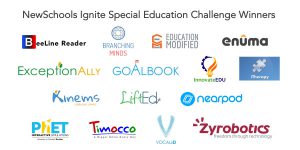We’re thrilled to announce $1.5 million in funding to the 15 winners of the NewSchools Ignite Special Education Challenge. This cohort of entrepreneurs brings a diversity of ed tech solutions with potential to impact the more than 6.4 million students with disabilities in the U.S. K-12 education system.
Congratulations to:
- BeeLine Reader
- Branching Minds
- Education Modified
- Enuma
- ExceptionALLY
- Goalbook
- InnovateEDU
- iTherapy
- Kinems
- LiftEd
- Nearpod
- PhET Interactive Simulations
- Timocco
- VocaliD
- Zyrobotics
Students with disabilities disproportionately face challenges in the classroom. More than 50 percent of states need additional support to meet federal special education requirements, and nearly 40 percent of students receiving special education services do not graduate from high school. Based on interviews with dozens of educators, thought leaders, and special education experts, we believe technology can support students with disabilities in the following ways:
- making rigorous academic content accessible to a wide range of students,
- encouraging increased communication and collaboration among diverse learners,
- supporting skills related to executive functioning and agency, and
- using data to empower students, families, and educators.
Challenge winners address one or more of these needs by creating innovative tools designed to help improve student learning in preK-12 schools.
Several winners focus on specific areas of content, such as STEM. PhET Interactive Simulations, a non-profit based out of the University of Colorado, aims to make its popular library of online math and science simulations accessible to students with audio or visual impairments. Zyrobotics also focuses on STEM for a younger age group — preK through 2nd graders, with an emphasis on providing tactile interactions applicable to a range of students with motor disabilities. Enuma offers a range of online applications for young learners to build executive function, especially in the context of math.
BeeLine Reader’s research-backed technology helps students—especially those with dyslexia, ADHD, or other special needs—to read more easily and effectively on-screen, while Nearpod utilizes multimodal learning delivery methods such as virtual reality and video to deliver custom lessons optimized for students with a wide range of disabilities.
Timocco is an occupational therapy tool that gamifies learning through software that incorporates fine tuning of motor skills using everyday objects. Similarly, Kinems provides an interactive movement-based learning platform with customizable games that combine movement therapies with ELA and Math academic skills for K-3 students with disabilities.
This cohort also includes a mix of tools and platforms designed to help educators personalize learning and more effectively manage the individualized education plan (IEP) process. Goalbook’s established platform offers research-based instructional goals and strategies for special and general education teachers, while Education Modified gives teachers tailored content and a workflow tool from an extensive, vetted database of research-based teaching strategies for any disability or learning challenge that focuses on practical implementation in the classroom.
Newcomer LiftEd offers a mobile academic and behavior tracking tool designed to address key data collection pain points currently felt by many special education educators, while Branching Minds’ platform creates a more seamless process for Response to Intervention (RTI) and pre-referral to special education in addition to enabling educators to track and monitor interventions for literature, math and student behavior. A Brooklyn school principal who serves a student population in which nearly 40 percent of students receive special education services designed InnovateEDU’s Cortex platform to create personalized learning progressions for students to own their data and drive their learning.
A few tools focus specifically on improving students’ ability to communicate. VocaliD strives to give every student who is unable to speak a customized, age-appropriate voice at an affordable price. Designed to increase student engagement and replace more generic, robotic-sounding voices on communication devices in classrooms, VocaliD mixes students’ utterances with crowd-sourced donor voices to give non-verbal students a unique voice. iTherapy allows students, especially those with autism, to communicate via picture-based inputs and outputs delivered by an avatar bearing their image, helping to guide learners to form words and better express emotions.
Finally, ExceptionALLY seeks to empower parents to advocate and collaborate in the special education process by giving parents a personalized slate of accommodation, modification and goal recommendations for their child’s IEP.
Join us in congratulating this outstanding group of ed tech innovators. We believe these products can make a difference in the lives of students with disabilities and we look forward to supporting these entrepreneurs in the coming months!
